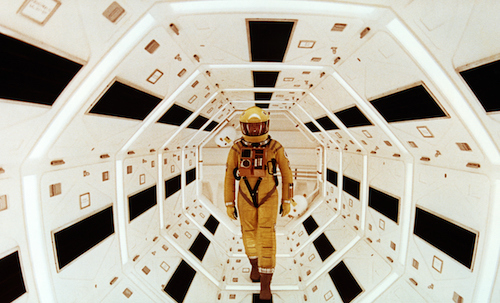
Stanley Kubrick's 2001: A Space Odyssey is regarded as a massive influence on filmmakers like Steven Spielberg and Peter Jackson. This generation-defining masterpiece is returning to Cineworld as part of our Sci-Fi Season and you can enjoy it at a discounted price of just £5.
If you've never seen 2001 on the big screen before, now is your chance to bask in the rule-breaking wonder of Kubrick's vision that does away with conventional storytelling and instead leaves the audience to soak up a sense of meaning. The film was adapted by Kubrick and celebrated sci-fi author Arthur C. Clarke, having been inspired by the latter's 1951 short story The Sentinel.
Here are five classic scenes from the movie that will resound on your Cineworld screen and remind you of what cinema is truly capable of.
1. 'Also Sprach Zarathustra'
Is there a better science-fiction opening than the dawning of the sun accompanied by the thunderous strains of Richard Strauss? It's less an opening and more a statement of intent on Kubrick's part: this will be like no sci-fi film you've seen before and promises to unleash the grandiosity of the known and unknown universe.
Kubrick initially commissioned an original film score from noted composer Alex North only to bin it off without telling him. (North only found out when attending the film's premiere.) 2001's carefully curated selection of classical soundtrack cues epitomises Kubrick's careful use of music as he fashions a delicate yet piercing tapestry of recognisable pieces to add commentary to our journey through the void.
2001's opening is certainly majestic on a visual level and also helped cement Kubrick's pioneering use of music in the later likes of A Clockwork Orange (Wendy Carlos adapting Purcell) and The Shining (Bartok; Ligeti).
2. The bone transition
The opening of 2001 is so famous that it was recently parodied in Greta Gerwig's mega-hit Barbie. We're introduced to our prehistoric ancestors as they communicate through grunts and primitive expression. Upon their discovery of a mysterious alien monolith, the primates are sent into a frenzy and one sends a bone flying into the air.
From there one of the greatest cinematic transitions ensues, aided by Geoffrey Unsworth's trailblazing cinematography. The arc of the bone's descent through gravity smoothly shifts into the gravitational turn of a satellite, the auditory savagery gliding into the elegant strains of Johan Strauss II's 'The Blue Danube' as Kubrick and his filmmaking team compress four million years of human evolution in one breathless swoop.
It's the first indication of 2001's abstract tone, the film's seemingly effortless ability to transcend time, and the pioneering miniature effects work from the renowned Douglas Trumbull. Several years later, Trumbull would channel his experiences with 2001 into his cult sci-fi oddity Silent Running.
3. "Open the pod bay doors, Hal"
2001: A Space Odyssey isn't a horror movie but it features one of cinema's scariest villains. Midway through the movie, we're introduced to the crew of the spaceship Jupiter One, chiefly Dr. Dave Bowman (Keir Dullea) and Dr. Frank Poole (Gary Lockwood).
They are passively observed by the ship's onboard intelligence system HAL-9000, voiced with susurrant menace by actor Douglas Rain. Despite his nominally objective intentions, HAL succeeds in killing Frank before attempting to do the same to Dave after the latter determines that the super-computer has made an error.
So influential was Rains' vocal performance that Anthony Hopkins modelled Hannibal Lecter's purr on it (he also threw in a bit of Katherine Hepburn). For his part, Kubrick was startlingly ahead of his time in observing how a sentient, non-human intelligence can become more of a hindrance and threat than a help, HAL being the clear progenitor to AI-generated big-screen menaces like The Terminator.
4. Through the 'Star Gate'
2001 is remarkable for how it jettisons the linear, predictable narrative of its science-fiction predecessors. Kubrick is instead aiming for pure immersive mood and suggestion, making oblique comments on the nature of human evolution and the development of technology without ever glibly stating things outright.
Somehow this intravenous injection of mood feels all the more authentic, dwarfing the reader with all manner of possibilities and implicitly suggesting how the sheer expanse of the cosmos is beyond standard human comprehension.
The movie becomes increasingly experimental in the final stretches as Keir Dullea's Dave is pulled into a vortex outside the orbit of Jupiter. He's then pulled into a dazzling tunnel of coloured light, colloquially known by fans as the 'Star Gate', and the very nature of human consciousness implodes in front of our eyes.
The sequence's hallucinogenic properties are very indicative of the late-sixties period in which the movie was made. However, the implicit message behind the sequence is now more relevant than ever before and is a clear influence on the likes of Jonathan Glazer's Under the Skin.
5. Dave becomes the 'Star Child'
What does the closing stretch of 2001: A Space Odyssey communicate to the viewer? It can't be denied that every spectator will see something different in Kubrick's audacious conclusion, affirming that 2001 is no passive movie experience but one that actively engages an audience's consciousness through show-don't-tell means.
Dave finds himself in a large bedroom where he sees, and then becomes, older versions of himself: first standing in the bedroom, middle-aged and still in his spacesuit, then dressed in leisure attire and eating dinner, and finally as an old man lying in bed.
Finally, as David reaches for the newly materialised alien monolith, he is transformed into a foetus that's enclosed in a transparent orb of light floating in space above the Earth. Evidently, there's a thematic connection linking back to the monolith that appeared at the start of the movie amidst mankind's primitive past, but what does it all mean?
The beauty resides in the movie's speculative and philosophical potential, rather than any self-assured concrete answers.
Click the link below to book your tickets for 2001: A Space Odyssey, which screens as part of Sci-Fi Season on February 6th.
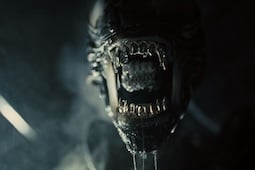
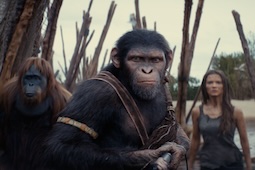
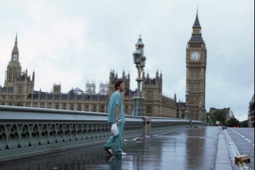
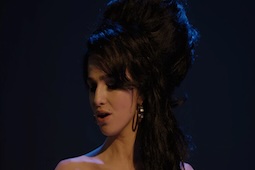
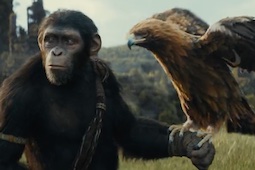
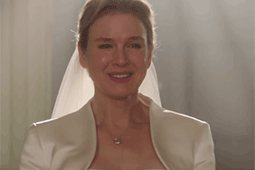
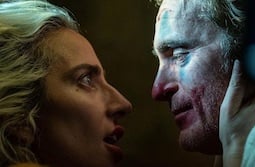
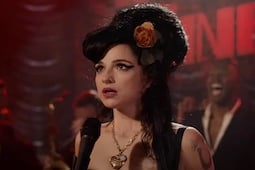
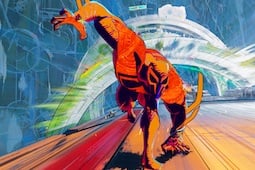
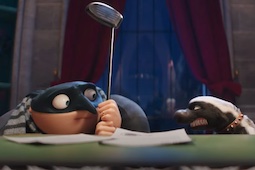
.jpg)
.jpg)

.jpg)
.png)



